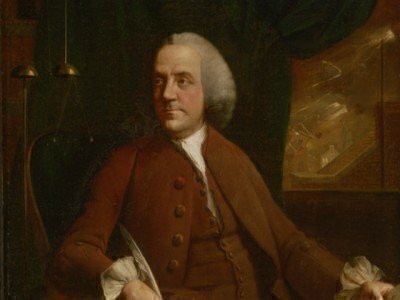On a late night 226 years ago today, the iconic American founder Benjamin Franklin passed away quietly at his daughter’s house in Philadelphia. So in terms of significant Americans, how highly do historians and publishers regard Franklin?

That would seem to be a nearly impossible question to answer, based on the vagueness of what qualities make a great or influential citizen. But in recent years, surveys taken by newspapers, TV producers and journalists of historians and academics have tried to rank the most influential Americans.
The efforts are surely ways to start a dialogue – or argument – in an effort to sell a few print publications or online ads, but in terms of Franklin, he is usually near the top of any such list – with one exception.
To sum up Franklin’s public career, it began in 1721 when he started writing for his brother’s newspaper as a teenager, and his last significant public efforts were as a moderating force at the 1787 constitutional convention in Philadelphia. In between, Franklin did a lot of things and he was probably the most well-known American in the world at the time of his death, and one of the most respected.
Link: A short Franklin biography
Franklin’s list of achievements in business, journalism, science, charity and politics is too long to recount here. Franklin’s role as a diplomat in Europe was a critical one for the nascent country, and he also was on the committee that drafted the Declaration of Independence.
Here is how Franklin ranks among historic Americans in four recent survey and ranking efforts.
The Atlantic (2006). In December 2006, the magazine asked 10 prominent historians to rank the 100 most influential Americans and consider “influence loosely—as a person’s impact, for good or ill, both on his or her own era and on the way we live now.”
In this survey, Franklin came in sixth, behind Abraham Lincoln, George Washington, Thomas Jefferson, Franklin Roosevelt and Alexander Hamilton. John Marshall and Dr. Martin Luther King Jr. were after Franklin.
Time Magazine (2012). As part of a Time project to rank the 100 most influential historical figures globally, Franklin was listed as the 35th most “significant” person in world history, with Paul the Apostle as 34th and George W. Bush as 36th. There were seven other Americans ranked ahead of Franklin in that global study, which was data-driven and not reliant on historians.
Biography Channel (1999). In a 25-part series, A&E’s Biography Channel looked at the 100 most influential people of the past 1,000 years.
And in this imposing list, Franklin was ranked at 68th, just ahead of William Harvey and Pope Gregory VII. Among the Americans, Elvis Presley, D.W. Griffith and Bill Gates were ranked ahead of Franklin.
Smithsonian (2014). In 2014, the editors at Smithsonian Magazine worked with Steven Skiena and Charles B. Ward, the data crunchers behind the Time magazine stories, to form a different kind of list of the 100 most significant Americans.
The magazine said that Skiena and Ward embrace a theory that accounts “not only for what individuals have done, but also for how well others remember and value them for it.” Smithsonian Magazine asked them to pull out the top 100 Americans in their database, and then the magazine sorted then into 10 different categories.
In the end, Franklin didn’t make Smithsonian Magazine’s top 100 significant Americans list, even though the list included Hulk Hogan, Madonna, Sarah Palin, Benedict Arnold and Charles Manson.
As a newspaper publisher, Franklin would probably appreciate the magazine’s efforts to sell a few special issues.
Scott Bomboy is the editor in chief of the National Constitution Center.






